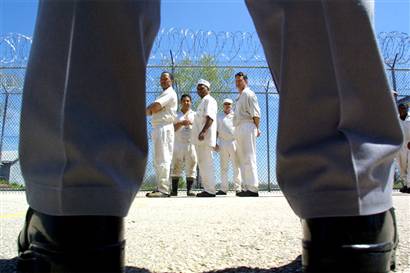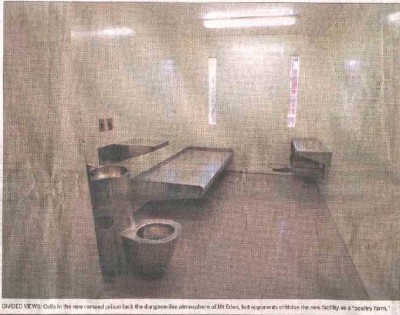Considering the implications of the presumption of innocence on the process of arrest, charge and remand in the criminal legal system, in two parts. This second part critically considers the arrest, charge and remand process from the perspective of the presumption of innocence and offers some suggestions on reform.
When I think about the entire process of how an accused is treated, it seems plain to me that it conflicts with that fundamental principle of criminal law – a person is innocent until proven guilty. Let’s consider that process more critically step by step.
Firstly, the media should never be brought along for an arrest. Why should they? If a person is innocent, then there should not be undue harm to their reputation than is necessary. That they were arrested can be reported but should pictures of their actual arrest be published or aired in the media? No, because it gives the wrong impression that the person is guilty when he is arrested. What other impression can you have when you can see in pornographic detail the police trying to arrest an accused? The media should only be allowed to participate from the time they are brought to court, not anytime prior to it.
Secondly, if a person is innocent until proven guilty, why should they be handcuffed and surrounded by the police when brought for remand or their trial? There should be no handcuffs of any sort. They are presumed innocent. If they attempt to escape then the prosecution can seek the court’s leave to restrain them with cuffs and police presence. But until that happens, they should be treated like a normal law-abiding citizen.
Thirdly, if they are innocent until proven guilty, why should the accused be made to sit in the dock throughout their trial? They are presumed innocent. They should be allowed to sit next to their lawyers during the trial. They can be put in the dock after their conviction for their sentence. But not at any time before that. The image of a person sitting in the dock leaves an impression of guilt not yet confirmed.
Why you may ask am I so bothered about how the accused looks throughout the process? For the simple reason that Justice must not only be done but also seen to be done. They are two sides to the same coin of Justice. Justice cannot be seen to be done with an accused who has been cuffed to all these impressions of guilt.
Fourthly, and most importantly, why should an accused be treated so poorly or shabbily? Sometimes I’m tempted to think that the prison, the police and the courts ‘conspired’ unwittingly to create such miserable conditions for an accused in the interest of expediency – to force them to plead guilty and save everybody the trouble of proving the case.
The conditions of remand must be reformed so that it accords with that fundamental principle: innocent until proven guilty.
What does this mean where remand is concerned? It means that the quality of life for a person in remand must be improved to the point that it is almost indistinguishable to that of a free average Malaysia citizen. They must be permitted as much liberty and comfort as possible within the confines of their remand cell. In short, they must be treated as if they are innocent. Anything less is an injustice and so a condemnation of our entire criminal legal system if not civilization. After all, a civilization or community should be judged on how it treats its criminals and marginalized – not its’ elite.
So how do we achieve this? I don’t have all the answers but I do have some ideas that I would like to share.
Firstly, the entire remand environment should be revamped to make it more like a home. There should be comfortable and adequate furniture, bedding and toilets. Where possible, an accused should be able to have some privacy for themselves. So sharing should be avoided as much as possible. Each accused should have their own room and be allowed to wear their own clothes. They can always wear a tag for identification.
Secondly, access to a reasonable array of entertainment should be given to them. Internet access, movies, music, musical instruments, pool room, sports facilities, for example. They are presumed innocent so they should be allowed to live their life as much as possible unhindered by their case. There should be a big field for them to stretch their legs and feel that freedom they have been denied momentarily. Lest I want to be mocked, I draw the line at massages, a bar, karaoke rooms with guest relation officers or opportunity to purchase recreational drugs of their choice.
Thirdly, reasonable and regular access to their family, lawyers and friends. Currently, friends are not allowed to visit. Why should a person presumed innocent have their range of social interaction reduced? Some people are closer to their friends than their families.
Fourthly, the food served should be as good as an average nasi campur restaurant or gerai so there is some element of choice. It should not be a subsistence diet because there should not be element of punishment during their confinement. A day should be reserved in a week or month for them to order whatever food they want.
These are some of the suggestions I have. Some may no doubt criticize my suggestions claiming quite rightly that providing such facilities may be very costly for our government. My reply to that would be that is how it should be. That is how it must be when we deal with the liberty of a person – it must cost a lot because it is only then that our government and our prosecutors will take their job more seriously and make sure they only charge those they think they have more than a fair chance of securing a conviction.
Imagine if it were really cheap to accuse a person of a crime. What would the government (by that I mean the prosecutors, the police, etc.) do? They would certainly lower their standards and charge those whom they think have only a fair chance of securing a conviction. If it were really cheap to house an accused, they would care even less because they cannot feel its financial implications. They will charge them even when they haven’t even completed securing all the evidence against an accused, especially the poor ones because they will end up in remand. And that is what is happening in our criminal legal system.
That is why our remand population in prison is growing if not exploding. The police and prosecution are charging recklessly especially those in the lower income group because they know that those are less likely to afford bail never mind a lawyer. They know that these are more likely to plead guilty and so make them look good because the police can close their file and the prosecution can declare another triumph against crime (even though it is a mere plea of guilty, but that is the standard of our current Attorney General. After all, he is the sort that argues bail applications in the Sessions Courts). They can file their statistics and show how efficient and effective they are then go back home and sleep soundly at night.
I don’t know how they do that when there is so much unnecessary and needless suffering going on in this area. I don’t know they can ignore such blatant injustices occurring no doubt on a daily basis. I wish I could say that I don’t know how such an obvious issue escapes the Home Ministry, the Attorney General, the prison authorities and even the Bar Council Criminal Law Committee which comprises some of our top legal criminal counsels. Sometimes I wonder, how can a dilettante at criminal practise like me who can only score pro-bono clients from the Bar Council Legal Aid Centre see and feel all this but it escapes all the doyens of this area of practise?
I wonder what they hear when the listen to their clients, or maybe they just don’t get those real down and out fellas like I do. Who knows?
All I know is the lot of them could do with some remand time.
Then maybe, just maybe, they might be moved to do something meaningful about it.
courtesy of Loyarburok.com






No comments:
Post a Comment